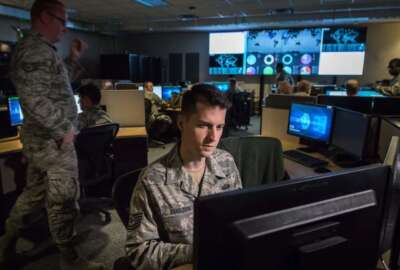Air Force applying the ‘Tom Brady effect’ to hiring cyber workers
Air Force Lt. Col. Andrew Wonpat, a member of the Air National Guard's Cyber Operations Group, said assessing non-traditional traits of employees is proving...
When it comes to hiring the next generation of cyber workers, the Air Force isn’t relying on typical pre-requisites as measures of success.
No doubt cyber certifications and training are important, but the service is also analyzing candidates at a whole other level.
Air Force Lt. Col. Andrew Wonpat, a member of the Air National Guard’s Cyber Operations Group, said the service is turning to a new approach, called the cyber decision cognitive assessment and readiness system (CYDE CARS) program, to expand the pool of cyber workers it can recruit.

“CYDE CARS really helps us get aligned to a lot of the Defense Department efforts in looking at talent management, acquisition and management, and where we see this is really as a program that we look at traits versus skills,” Wonpat said on Ask the CIO. “We actually did that by using Electroencephalography (EEG) and biophysical sensors. We used to look at the cognitive aspects of the candidates that we assessed. Now through this assessment, we really looked at five specific traits as they aligned to a specific cyber work roles. They were focused under pressure, methodical thinking, attention to detail, decisions on ambiguity and perseverance. Those five traits, anybody would say, for any job, are beneficial. But for a specific cyber work role, it’s not whether or not you have the traits, it’s to what degree do you have each of those traits.”
For example, the attention to detail trait matters in cybersecurity to see both the small issues, as well as the larger perspective of how the risk could impact the organization.
CYDE CARS tests measure potential cyber workers across three categories; operational, cognitive and personality. Within those categories, the tests analyzes 16 characteristics including focus under pressure, methodical thinking, attention to detail, decisions under ambiguity and perseverance.
Wonpat said, generally speaking, there are at least two parts to the assessment. One part is gamified to test cognitive skills. The second is more interactive and real-time focused on tasks with a computer.
Finding cyber Tom Bradys
Wonpat said by using the test to identify and assess individuals that have a higher likelihood of passing the service’s “incredibly difficult cyber training” for specific work roles. He said when servicemembers don’t pass the cyber training exams, and there is more than a 50% attrition rate, it leaves commanders and other leaders in a tough spot because there isn’t usually a plan for what to do with those recruits who wanted to go into cyber, but struggled.
“I get this visceral feeling because I was so embarrassed that I wasn’t thinking like that. I’m supposed to be a leader but in my mind I was failing them. That really just galvanized me to get after the problem,” he said. “As I started talking to people, not in cyber, I talked about these high performing teams for the NFL, for the special operations command and so many others. So that is what drove me to try to figure out, along with a few other people, how do we identify those people to create a high performing cyber team? We know it’s very hard to get people into the cyber training pipeline. So when we started to look at how do we find those people and I was talking to the people that are helping us do this and they used a term called the [former NFL quarterback] ‘Tom Brady effect.’ When you look at Tom Brady, by objective measures, he was not a phenomenal athlete. He was picked in the sixth round. If you look at his numbers, he is average or below average for very for most of the statistics. But if you look at Tom Brady, he is one of the most phenomenal athletes has ever graced football. There are a lot more Tom Brady’s out there, how do we go find them that can be successful on the cyber side?”
The hope is through CYDE CARS to identify, recruit and train more and better cyber workers who will stay with the Air Force, the DoD or the federal government at large for a long time.
The results in the limited time CYDE CARS has been around, for almost three years, have been telling.
Wonpat said about 407 people have gone through the CYDE CARS program, with 105 being students at the University of Pennsylvania’s Wharton School of Business.
“Of the 105 students, what’s really fascinating is with this specific CYDE CARS program or the technology and the assessment itself, we were able to not only discern who was in a science, technology, engineering and math (STEM) major, but more importantly, of that group of STEM majors, who was in a computer science field. Doing this assessment, it can identify people that are more likely to think like computer scientists,” he said. “It makes sense for the specific type of training we need to get through to be at that level those kinds of methodical thinking, attention to detail, perseverance, decision ambiguity and stuff like that. A big part of being successful through that training was the ability to make good decisions under stress, but that goes with any job. But now for as it relates to cyber, now with the technology, we can actually assess that now so we should be pulling that forward to help identify those candidates that are more likely to get through that process.”
Validating approach to cyber competencies
He said these assessments are open to anyone in the DoD or U.S. government.
In a perfect world, every Air Force servicemember and civilian employee would go through this assessment to better identify untapped skillsets and possible career paths.
“Hopefully, this helps could reduce our retention problem. From a recruit coming in, if we keep them more engaged in the career field they’re going to learn, then they’ll be able to apply it better,” Wonpat said. “In the end, they’ll stay longer and they’ll be able to contribute to the mission better. This is pie in the sky stuff, but there’s no real reason that we shouldn’t consider it even more.”
Wonpat said the Air Force has been working with professors at UPenn and others on the neuroscience of how this works and to validate the testing approaches.
“The success would be more people graduating from the cyber training, so that’s what it comes down to. The intent when we stood up was to follow people through the entire training pipeline,” he said. “One of the ways that I measured success was after we did all this, we started getting the services to use it. I said, ‘Well, let’s find other volunteers that know nothing about this.’ We found another control group and so I gave it to a bunch of people that were Army, Navy, Marine Corps and government civilians and we had them take this exact same assessment. And sure enough, these people were fully qualified, but they had never heard of it. They had never seen it. Then sure enough, their results literally showed that if you knew nothing about these people and you were to put them in the cyber pipeline, they have a high likelihood of passing the cyber training. So that’s how we measure the impact of the training.”
He said unfortunately funding for CYDE CARS ends this month and he’s unsure if the Air Force or DoD will be able to keep it going.
“All that means is that the program will not continue to be sustained as new patches comes out for the courses or new research refines the approach,” Wonpat said. “It still will be available to the DoD as its current form. But any future improvements won’t be done without some kind of sustainment tail.”
Copyright © 2025 Federal News Network. All rights reserved. This website is not intended for users located within the European Economic Area.
Jason Miller is executive editor of Federal News Network and directs news coverage on the people, policy and programs of the federal government.
Follow @jmillerWFED







